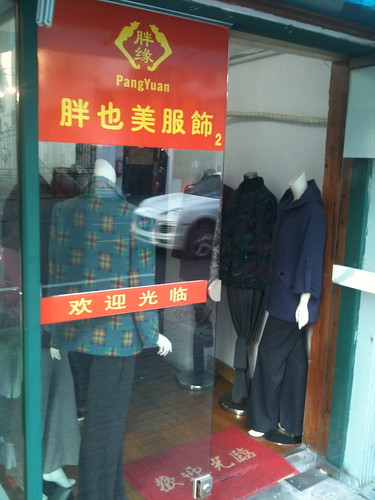Fat, and also Beautiful
The first part of the name of this shop qualifies for the “really simple signs” file:
The name of the store reads 胖也美服饰, literally, “fat also beautiful apparel.” This is the equivalent of a plus sizes store in the US (although, looking at the official 胖也美 website, the Chinese 胖 isn’t quite as big as the American “plus”).
To make it even clearer exactly what they’re selling, the 胖也美 website also uses the phrase 胖人服饰, which could be literally translated as “fat people apparel.”
This is one of those cases where culture makes a huge difference in translation.


On second though, 胖也美 would be better translated as “fat is also beautiful.” Chinese words can glide effortlessly between parts of speech…
Chinese people really say things as they are. It’s raining, you’re fat, you’re nose is so big! I think in China it’s better to have a good self-confidence because the minute I came to China I transformed from size M to XXL or something like that.
I love the parsimony with words that characterises so many things in Chinese – there’s a lot to be said for allegory, metaphor and poetry, but not as much for simple euphemism.
胖 is relative, I suppose. I have to wonder how many of 胖也美’s items a portly mid-westerner could actually squeeze into?
Wondering what brought you to 东莞市?
I wish I had a photo of the clothing store sign I used to see in Shenzhen–it was in English: Fat People’s Shop.
I went from being XXL in US, to being unfathomably fat in China.
My mom who was a M in the US, was told “We have your size, really, really big.”
People who were selling clothes when I walked by NEVER EVER attempted to get me to look in their store or explore their goods.
I think English is just a bit deficient in vocabulary when it comes to softer words for fat. For the opposite we have slim, thin, and skinny that basically have the same meaning but with different connotations (positive, neutral, or negative), but for fat we just have fat. We have terms like “plus sized,” “husky,” or “stocky,” but they aren’t really common enough in conversation and are mostly limited to clothing retailers’ advertising.
I’ve been told I look fatter, as a compliment (I was, and probably still am, underweight). I guess saying I looked like I’d gained weight would be a better way to say it, but that could still be taken the wrong way.
It seems to me that English “fat” is opposite to “skinny,” but Chinese “胖” is closer to being the opposite of “thin,” with a more neutral connotation.
I went to Taiwan for a vacation last December. In the States, I quite enjoy being a size 4. Because I had neglected to take cool-weather clothes with me (blame my iPhone weather app) I had to buy some there, and discovered I was a LARGE!!! To make matters worse, all my friends there ordered huuuuuuge amounts of food for me to eat! No, it wasn’t just Taiwanese hospitality. All of them had lived in the US for a number of years, and had gained weight, so I think they were getting even!
This is where some artistic license in the translation may need to take place.. We can translate literally for the sake of education.. or we can paraphrase and come up with something a little more like “Big and Beautiful Clothing”, which is how I would translate it.. 🙂
I love the frankness of Chinese.
Sara, that last part actually boosted my self confidence.
[…] 胖人服侍 as “Fat people apparel” — a nice example of the great divide between superficial meaning and cultural expectations […]